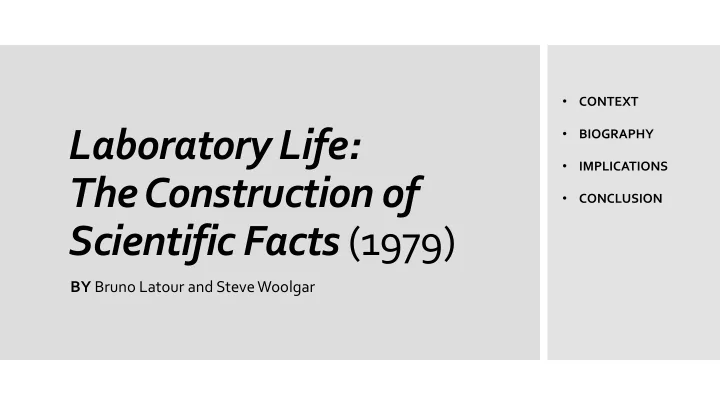

• CONTEXT Laboratory Life: • BIOGRAPHY • IMPLICATIONS The Construction of • CONCLUSION Scientific Facts (1979) BY Bruno Latour and Steve Woolgar
Thomas Kuhn’s The Structure Michel Foucault’s The Order of Things: An Archaeology of the of Scientific Revolutions (1962) Human Sciences (1966) CONTEXT
Bruno Latour (1947- present) Laboratory Life (1979) Science in Action (1987) We Have Never Been Modern (1991) BIOGRAPHY Reassembling the Social (2005)
Social Constructivism “… all interactions are social” ( 281; original emphasis) Anthropological Standpoint The investigators focus on “observations of actual laboratory practice” (153) or draw attention to “the process by which scientists make sense of their observations” (32). More specifically, they utilize the idea of “anthropological IMPLICATIONS strangeness”, according to which the lack of prior knowledge does not prevent one from gaining understanding of science (29). The Nature of Facts and Social Construction Deconstructed “A fact is nothing but a statement with no modality—M—and no trace of authorship” (82). As he vividly says, in order to persuade others that one’s statements should be taken seriously, “rats had been bled and beheaded, frogs had been flayed, chemicals consumed, time spent, careers had been made or broken, and inscription devices has been manufactured and accumulated within the laboratory” (88).
Laboratories are now powerful enough to define reality. . . [R]eality as the Latin word res indicates, is what resists. What does resist? Trials of strength. If, in a given situation, no dissenter is able to modify the shape of a new object, then that’s it, it is reality, at least for as long as the trials of strength LATOUR are not modified. . . The minute the contest stops, the minute I write the word ‘true’, a new, formidable ally suddenly appears ON LABORATORIES in the winner’s camp, an ally invisible until then, but behaving now as if it had been there all along: Nature (from Latour’s Science in Action , 1987, 93–94).
Facts refuse to become sociologised. They seem to be able to return to their state of being ‘out there’ and thus to pass beyond the grasp of sociological analysis. In a similar way, our demonstration of the microprocessing of facts is likely to be a source of only temporary persuasion that facts are constructed. LATOUR ON FACTS Readers, especially practicing scientists, are unlikely to adopt this perspective for very long before returning to the notion that facts exist, and that it is their existence that required skillful revelation (175).
On page 29, Latour and Woolgar claim they utilize ethnography in order to achieve “anthropological strangeness” in their examination of the lab. Do they achieve such anthropological strangeness? Why or why not? Which of Latour and Woolgar’s observations about the nature of fact construction within the laboratory space could probably be CONCLUDING extended to all labs? QUESTIONS Are labs ever purely spaces of experimentation or is there always some level of politics/bureaucracy involved? Are Latour and Woolgar’s claims about the nature of fact construction trivial or common-sense? What risks, if any, are involved in questioning how, where, and why facts are constructed?
Recommend
More recommend